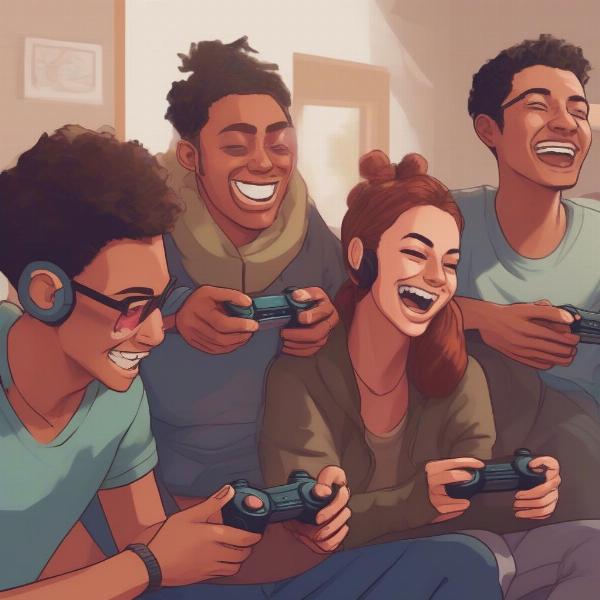Are video games a sin? This question weighs heavily on the minds of many, particularly those with strong religious beliefs. It’s a complex issue with no easy answers, demanding a nuanced understanding of both faith and the ever-evolving world of gaming.
Playing video games has become a ubiquitous pastime, a vibrant form of entertainment and even a competitive sport for millions worldwide. But for some, this digital world clashes with their moral compass, prompting concerns about violence, addiction, and the potential displacement of more wholesome activities. So, is indulging in virtual adventures a transgression against religious principles? Let’s delve into this debate.
Exploring the Concerns: Why Some Consider Gaming a Sin
The primary concerns surrounding video games often stem from their content and potential negative impacts. Some religious individuals argue that violent video games desensitize players to violence, potentially fostering aggression in real life. Others worry about the addictive nature of gaming, leading to neglect of responsibilities, social isolation, and even health problems. There are also concerns about the time commitment involved, potentially taking away from activities like prayer, religious study, or community service.
Violence in Video Games: A Moral Dilemma?
The depiction of violence in video games is a major point of contention. Critics argue that graphically violent games normalize brutal acts, potentially blurring the lines between fantasy and reality. However, proponents argue that this is a simplistic view, overlooking the narrative context, artistic expression, and the ability of players to distinguish between virtual and real-world actions. For instance, a game like The Last of Us Part II, while graphically violent, also explores complex themes of revenge, forgiveness, and the human cost of conflict.
Addiction and Time Management: Finding a Healthy Balance
Another common concern is the potential for video game addiction. Spending excessive time gaming can indeed lead to negative consequences, neglecting personal relationships, academic pursuits, and even basic self-care. This is where responsible time management becomes crucial. Just like any form of entertainment, moderation is key. Setting healthy boundaries and prioritizing real-life obligations is essential for enjoying video games without letting them become detrimental. Similar to the dilemma of are video games a sin, balancing entertainment with real-life responsibilities is always a challenge.
 Video Game Violence and Moral Dilemma
Video Game Violence and Moral Dilemma
The Counterarguments: Why Gaming Can Be a Force for Good
While concerns about video games are valid, it’s important to acknowledge the potential positive impacts they can have. Gaming can foster creativity, problem-solving skills, and strategic thinking. Multiplayer games can promote teamwork, communication, and social interaction. Furthermore, video games can offer a sense of community and belonging, particularly for those who may struggle with social interaction in real life.
Cognitive Benefits and Skill Development
Many video games require players to think critically, solve puzzles, and make strategic decisions. These activities can enhance cognitive function, improve reaction time, and develop problem-solving abilities. Games like Portal 2 and The Witness are prime examples of how video games can challenge the mind and foster creative thinking. Just as there are strategies for winning in certain games, as explained in which video poker game has the best odds, real life also requires strategic thinking.
Social Connection and Community Building
Online multiplayer games can provide a platform for social interaction and community building. Players can connect with others who share their interests, forming friendships and support networks. This can be particularly beneficial for individuals who may feel isolated or marginalized in real life. The sense of camaraderie and shared experience can be a powerful force for good.
 Positive Impact of Video Games on Cognitive and Social Skills
Positive Impact of Video Games on Cognitive and Social Skills
Finding a Middle Ground: Responsible Gaming and Faith
Ultimately, the question of whether video games are a sin is a matter of personal conscience and interpretation. There’s no one-size-fits-all answer. It’s important to consider the specific content of the games being played, the individual’s susceptibility to addiction, and the potential impact on their spiritual life.
Dr. Emily Carter, a renowned theologian and avid gamer, suggests, “The key is moderation and mindful engagement. Just as with any form of entertainment, we must be discerning about the content we consume and the time we invest. We should ask ourselves, ‘Is this enriching my life or detracting from it?'”
Setting Healthy Boundaries and Prioritizing Values
Establishing clear boundaries and prioritizing values are essential for responsible gaming. This may involve limiting playtime, choosing games with appropriate content, and ensuring that gaming doesn’t interfere with other important aspects of life, such as family, work, or religious practices. Similar to deciding when are logic games going away, setting boundaries for video games can also involve making choices about when to stop playing.
Engaging with Games Thoughtfully and Critically
It’s also crucial to engage with games thoughtfully and critically. Rather than passively consuming content, consider the underlying messages, themes, and values being presented. Discuss your experiences with others, and reflect on how gaming impacts your thoughts, emotions, and behavior. By approaching gaming with awareness and intention, we can ensure that it remains a positive and enriching part of our lives. For fans of particular series, understanding how to access them, like learning how can i watch hunger games mockingjay part 2, can be a helpful skill.
 Responsible Gaming and Faith: Finding a Balance
Responsible Gaming and Faith: Finding a Balance
Related Topics: Expanding the Conversation
The Impact of Esports on Communities
Esports has become a global phenomenon, creating communities and offering opportunities for professional gamers. This raises questions about the ethics of competition, the role of sponsorships, and the potential impact on younger generations.
The Role of Video Games in Education
Video games are increasingly being used as educational tools, offering engaging and interactive ways to learn new skills and concepts. This raises questions about the effectiveness of game-based learning and the potential for integrating games into traditional educational settings.
The Future of Virtual Reality and its Ethical Implications
Virtual reality technology is rapidly evolving, blurring the lines between the physical and digital worlds. This raises ethical questions about the potential impact on our perception of reality, the potential for addiction, and the implications for social interaction.
Conclusion: A Matter of Personal Responsibility
Is playing video games a sin? The answer isn’t a simple yes or no. It’s a matter of personal conscience, mindful engagement, and responsible behavior. By approaching gaming with awareness, setting healthy boundaries, and prioritizing our values, we can ensure that it remains a positive and enriching part of our lives, compatible with our faith and beliefs. Just as we make choices about other forms of entertainment, so too must we approach gaming with discernment and intention.
FAQ
-
Can playing violent video games lead to real-life aggression? Research on this topic is ongoing and inconclusive. While some studies suggest a correlation, others argue that other factors, such as pre-existing aggression or social environment, play a more significant role.
-
How can I prevent video game addiction? Set clear limits on playtime, prioritize real-life responsibilities, and seek professional help if you feel your gaming habits are becoming problematic.
-
Are all video games bad? No, just like any form of media, there are a wide variety of video games with different content and themes. Some games can be educational, promote prosocial behavior, and offer enriching experiences.
-
How can I find games that align with my values? Look for games with positive messages, age-appropriate content, and gameplay that promotes skill development and critical thinking.
-
Can video games be a part of a healthy lifestyle? Yes, as long as they are enjoyed in moderation and don’t interfere with other important aspects of life, such as work, relationships, and physical activity.
-
How can I talk to my children about responsible gaming? Open communication is key. Discuss the potential benefits and risks of gaming, set clear expectations, and encourage healthy gaming habits.
-
What resources are available for those struggling with video game addiction? There are numerous organizations and support groups that offer help and resources for those struggling with video game addiction. You can also consult with a mental health professional for guidance and support.

